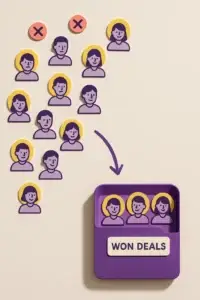In This Article
- Improve Your Sales Prospecting: Introduction
- 5 Tips to Improve Your Sales Prospecting Rates
- Know Your Sales Prospecting Numbers
- Daily CRM Checks
- Have the Right Mindset
- In Sales Prospecting, Knowledge is Vital
- Don’t Sell—Solve
- Conclusion
Improve Your Sales Prospecting: Introduction
In order to grow and succeed as a business, you need to always be ready for improvement. It doesn’t matter how big or small that improvement is, every little helps. This is much the same if you’re trying to improve your sales prospecting rates. Give yourself the space to adjust and it’ll put you and your sales in good stead.
What can be done to improve your sales prospecting rates? Here are 5 tips to build into your prospecting that will benefit your sales strategy.

5 Tips to Improve Your Sales Prospecting Rates
1. Know Your Sales Prospecting Numbers
Not all leads are created equal. Ultimately, it comes down to the numbers, because your time is precious, and if your leads don’t make the most of it then it’s not necessary to push for a sale.
What profit are you expecting to get from the sale? How much time are you wiling to give them to achieve it? If you find yourself giving more time to a prospect than it’s worth, you’re more likely to feel demotivated when attempting to nurture and then sell to that prospect.
For motivation’s sake, and for time’s sake, prioritise the prospects that give more value. The bigger the chance of a sale, and the better the profit, will make that time more valuable and motivate you more. If you have the right resources, you can reap a better reward.
What really makes a difference is maximising the time you have whilst also understanding the sales process innately. This is seen best in your conversion rates—how many times do you convert successfully, and how long does it take? Take the time to note down how many calls you make before you get to a meeting; and how many meetings you have before you get to a sale.
Perhaps the most important question is: how many ‘no’s do you get from a prospect before they say yes? Usually, a prospect will say ‘no’ 6 times before they say ‘yes’, but this is subject to change for every company.
2. Daily CRM Checks
You don’t have to spend all your time in your CRM if you don’t want to, but keeping an eye on things regularly is one of the best ways to prevent forgetting follow ups or missing out on sales opportunities.
Daily CRM checks give you the benefit of knowing your sales process inside and out—and your prospects inside and out, too. You’re always caught up on your immediate prospects; on who they are, when they should be contacted, and what you need. Any discrepancies can be spotted and ironed out before it has any lasting effects. Plus, having at least one person in your team up to date puts the whole team in a better position—though best practice is for everyone to conduct daily CRM checks and keep themselves updated.
Keeping yourself updated means you’re always on the ball—you’re always prepared. Being one step ahead will improve your sales prospecting rates because you already know who you need to prioritise, and you can do this with confidence.
3. Have the Right Mindset
This confidence really comes into play here. As with anything, your mindset is a huge factor in your success. How you approach your prospect can determine how successful your sale is.
If you’re not confident about the follow up, it’ll show. Whether you want it to or not, it will affect your language, your tone, even the way you structure your thoughts. Think yourself unsuccessful and you’ll encourage it; press for success and your prospect is more likely to be on board. This is why knowing your numbers is central to your sales prospecting strategy—you don’t need to feel desperate if you know you’re not dependent on every call being a yes.
After all—if you don’t believe in yourself, then why should your prospect too?
4. Knowledge is Vital in Sales Prospecting
When it comes to buying, prospects want to feel informed. That’s why 70% of the buying decision is made before a prospect talks to the company (from They Ask, You Answer). This is because prospects don’t want to be one step behind—they need to be an equal player in the conversation.
So knowledge is vital, for both players in a transaction. If you can inform each other, teach each other, then you’ll have a deeper understanding of what’s needed, rather than just attempting to talk at each other. The prospect needs to come away from the sale having gained something; you just need to make that happen.
Knowledge, for you, includes having as much insight under your wings as possible. Keep notes on your prospect, and note down any information that informs their motives and contexts—and therefore, your responses. Know when to reach them, and how to reach them. The more you can prove that you listen and understand, the more your prospect will appreciate the effort.
This will reduce the amount of calls you need to make, as any intelligence gathered will help you form a better picture of what the prospect is. This will translate well into your sales pipelines—knowing when you need to contact. You can set yourself reminders to follow up, so you never leave anyone behind.
5. Don’t Sell—Solve
All this intelligence, this confidence—it all goes towards answering one question: why does your prospect need to buy this from you?
What is it about your business that can solve their problem? How are you uniquely positioned to do so, and what does the prospect need to know in order to see this?
If you know how to answer these questions, you know how to make the sale.
Make sure your business tools are helping you to see that ‘why’—so you can demonstrate this to your prospect. This is what you should set out to do in your CRM; in popcorn, the intelligence you gather from your notes, your reporting, from tracking your prospect’s activity on your website and their place in the sales pipeline—all of these are designed to help you answer that question.
Ultimately, when you can prove your business to a prospect, you can prove a sale. This is how it improves your sales prospecting rates—because you’re the right fit, every time.

Conclusion
Improving your sales prospecting rates comes from improving your approach to the prospect. Don’t be afraid to ask ‘why’: why that prospect, why that problem, why this solution. The better your answers are, the better you can arm yourself with he right knowledge. This means you’re also more likely to have the right prospects: prospects that not only see you as the right fit for them, but are themselves the right prospects for you. This confidence will take you all the way to a sale, and keep your sales prospecting rates looking healthy—and your business, too.
Did you know popcorn tracks and scores all your prospects’ activities on how likely they are to close a sale, so you always know who to target and why? You can find out how this benefits your sales prospecting rates by clicking here.
Enjoyed this post? Comment below or read through our blog for more lead management and CRM tips, especially for small businesses.










